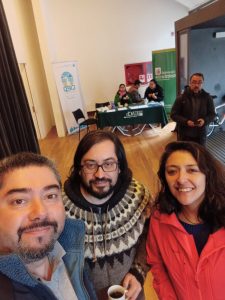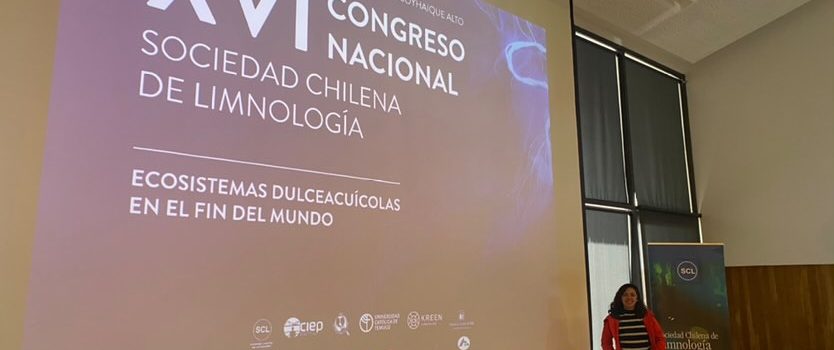IFOP researchers participate in XVI National Limnology Congress
October 28th, 2022 Limnology is the study of aquatic ecosystems, mainly lakes, reservoirs, rivers and wetlands.
Limnology is the study of aquatic ecosystems, mainly lakes, reservoirs, rivers and wetlands.
In October, XVI National Limnology Congress was held in Coyhaique city at Aysén Region,
Doctors Rodrigo Vera, Osvaldo Artal and Claudia Pérez participated in IFOP’s representation.
About their presentations
Title: Invasive cyanobacteria Dolichospermum lemmermannii Blooms in Chiloé Island freshwater systems, Chile
This work’s presentation at XVI Limnology Congress is related to cyanobacterial blooms that occurred in water bodies of Chiloé’s analysis, precisely in Tarahuín and Huillinco lakes, and Mechai estuary. Through genetic analysis we identified flowering species as Dolichospermum lemmermannii. Toxin assays recorded five microcystin analogs presence . These blooms analyzes are under development, since work is being done on other cyanotoxins identification and quantification. Viviana Almanza from Uiversidad de Concepción EULA center also participated in this work development; Luis Norambuena, Gonzalo Fuenzalida and Jorge Mardones from Fisheries Development Institute’s CREAN center and Angélica Lisperguer from INITI.
Claudia Pérez Sáez, is a Marine Biologist and Doctor in Environmental Sciences from Universidad de Concepción; Her interest area relies on biogeochemical processes in freshwater and marine systems research influenced by different anthropogenic factors. She is linked to Puerto Montt IFOP’s environmental group, she performs tasks in environmental state of lakes assesment.
Title: FLOW: A freshwater explorer and visualizer in Chilean Patagonia within CHONOS.
This presentation deals with a new web tool available in oceanographic observation system CHONOS (chonos.ifop.cl). This web tool is called FLOW and presents daily freshwater flows between 1980 and 2018 at discharge points of rivers and glaciers in the coastal area between the Los Lagos and Magallanes regions. FLOW allows you to explore and visualize these results in an easy and friendly way. FLOW is available to the entire community. More details can be found on our YouTube channel
Osvaldo Artal is a geophysicist and Ph.D. in physical sciences from Universidad de Concepción, an expert in numerical modeling and data analysis with an emphasis on physical oceanographic processes in fjords and channels in Chilean Patagonia. Main lines of research: Dynamics of fjords, Mixing processes, turbulence, tides and marine energies.
Title: Ecosystem services of 4 basins of Chiloé, Chile
The Huillinco-Cucao Basin System is made up of the union, through tributaries and effluents, of 4 lakes on the Big Island of Chiloé: Tarahuín, Tepuhueico, Huillinco, all flowing into Lake Cucao, including 9.9% of the surface of the Big Island.
For this basin system ecosystem conceptual map construction information services were used from data obtained from sources such as IDLE, CORFO, SERNATUR, Ministry of Environment and Google with which thematic maps were prepared showing the area’s characteristics, water rights, tourist points of interest, pompom extraction, national parks, wetlands, fish farms, water quality stations, RILes and others.
Within the ecosystemic services basin system’s 4 main classification categories, provision, regulation, cultural and biodiversity appear. Provisioning services are related to food, wood and water that the watershed provides, either naturally (eg water supply) or through its production (agriculture). Regulation-type services are related to climate, air quality, erosion, natural hazards, water, pollination, water quality and treatment, soil formation, and regeneration. Services of a cultural nature give rise to ES for recreation and aesthetic values, which are related to the landscape and the possibility of accessing them to develop recreational activities. Lastly, biodiversity and habitat ecosystemic services provide genetic and ecological support. Maps and a conceptual model of the basin system are presented.
Rodrigo Vera is a Marine Biologist and Doctor of Science: Systematics and Ecology. Main areas of interest have been biological oceanography, carbon fluxes in the water column (biological sequestration of CO2, and its effect on global warming), marine ecology and the environment, heavy metals in water, biota and sediments.
Press related links:
